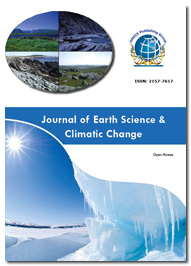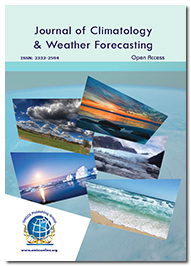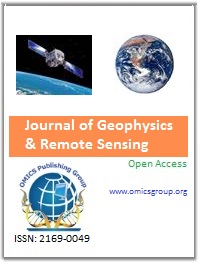Theme: Updating our Understanding:Earth's Climate is Warming
Climate Change 2016
ConferenceSeries Ltd Conferences invites all the participants across the globe to attend the ‘World Conference on Climate Change (Climate Change 2016)’ during Oct 24-26, at Valencia, Spain that includes prompt keynote presentations, Oral talks, Poster presentations and Exhibitions.
Climate Change 2016 is organised with the theme “Updating our Understanding: Earth's Climate is Warming” OMICS International conference series organizes 1000+ Global Events inclusive of 300+ Conferences, 500+ Upcoming and Previous Symposiums and Workshops in USA, Europe & Asia with support from 1000 more scientific societies and publishes 700+ Open access journals which contains over 30000 eminent personalities, reputed scientists as editorial board members.
Track 1: Climate Change & Climatology
Climate change, also called global warming, refers to the rise in average surface temperatures on Earth. Climatology, the science of Climate and its relation to plant and animal life, is important in many fields, including agriculture, aviation, medicine, botany, zoology, geology, and geography. Changes in Climate affect, for example, the plant and animal life of a given area. Climatology, the science of Climate and its relation to plant and animal life, is important in many fields, including agriculture, aviation, medicine, botany, zoology, geology, and geography. Changes in Climate affect, for example, the plant and animal life of a given area.
Related Climate Change Conferences | Climate Events |:
5th International Conference on Earth Science and Climate Change 2016 July 25-27, 2016,Thailand; International Conference on Coastal Zones 2016, May 16-18, 2016 Japan; International Conference on Pollution Control and Sustainable Environment April 25-26, 2016, UAE ;International conference on Green Energy and Expo September 21-23, 2015,USA; 3rd World Congress & Expo on Recycling Oct 06-07, 2016 Miami, USA; Asia-Pacific Conference on Environmental Sciences and Engineering (ACESE 2015), November 16-17, 2015 United Arab Emirates; 8th International Conference on Climate Change: Impacts and Responses 2016, April 21-22, 2016, Viet Nam; 2nd International Conference on Geographical Information Systems Theory, Applications and Management - GISTAM 2016 26-27 April, Italy; Hexagon Geospatial Defence Summit Western Europe31 May - 02 June, The Netherlands; International Workshop on Risk Information Management, Risk Models, and Applications 27-29 June Germany;
Track 2: Evidence of Climate changes
Many lines of scientific evidence show the Earth's climate is changing. This page presents the latest information from several independent measures of observed climate change that illustrate an overwhelmingly compelling story of a planet that is undergoing global warming. Our world is getting warmer. Over the last 100 years the average global surface temperature has risen by about 0.74C. For scientists studying the impacts of climate change, such questions - and answers - are constantly being revised and refined as more information is gathered, models are fine-tuned, and feedbacks are better understood.
Related Climate Change Conferences | Climate Events |:
5th International Conference on Earth Science and Climate Change 2016 July 25-27, 2016,Thailand; International Conference on Coastal Zones 2016, May 16-18, 2016 Japan; International Conference on Pollution Control and Sustainable Environment April 25-26, 2016, UAE ;International conference on Green Energy and Expo September 21-23, 2015,USA; 3rd World Congress & Expo on Recycling Oct 06-07, 2016 Miami, USA; Asia-Pacific Conference on Environmental Sciences and Engineering (ACESE 2015), November 16-17, 2015 United Arab Emirates; 8th International Conference on Climate Change: Impacts and Responses 2016, April 21-22, 2016, Viet Nam; 2nd International Conference on Geographical Information Systems Theory, Applications and Management - GISTAM 2016 26-27 April, Italy; Hexagon Geospatial Defence Summit Western Europe31 May - 02 June, The Netherlands; International Workshop on Risk Information Management, Risk Models, and Applications 27-29 June Germany;
Track 3: Global Warming Effects and Causes
Most climate scientists agree the main cause of the current global warming trend is human expansion of the "greenhouse effect"1 — warming those results when the atmosphere traps heat radiating from Earth toward space. Human activities are changing the natural greenhouse. Over the last century the burning of fossil fuels like coal and oil has increased the concentration of atmospheric carbon dioxide (CO2). Global warming is primarily a problem of too much carbon dioxide (CO2) in the atmosphere—which acts as a blanket, trapping heat and warming the planet.
Related Climate Change Conferences | Climate Events |:
5th International Conference on Earth Science and Climate Change 2016 July 25-27, 2016,Thailand; International Conference on Coastal Zones 2016, May 16-18, 2016 Japan; International Conference on Pollution Control and Sustainable Environment April 25-26, 2016, UAE ;International conference on Green Energy and Expo September 21-23, 2015,USA; 3rd World Congress & Expo on Recycling Oct 06-07, 2016 Miami, USA; Asia-Pacific Conference on Environmental Sciences and Engineering (ACESE 2015), November 16-17, 2015 United Arab Emirates; 8th International Conference on Climate Change: Impacts and Responses 2016, April 21-22, 2016, Viet Nam; 2nd International Conference on Geographical Information Systems Theory, Applications and Management - GISTAM 2016 26-27 April, Italy; Hexagon Geospatial Defence Summit Western Europe31 May - 02 June, The Netherlands; International Workshop on Risk Information Management, Risk Models, and Applications 27-29 June Germany;
Track 4: Climate Change: Biodiversity Scenarios
Scenarios of changes in biodiversity for the year 2100 can now be developed, based on scenarios of changes in atmospheric CO2, climate, vegetation, and land use and the known sensitivity of biodiversity to these changes in terrestrial and freshwater ecosystems. This synthesis focuses on estimates of biodiversity change as projected for the 21st century by models or extrapolations based on experiments and observed trends. The term “biodiversity” is used in a broad sense as it is defined in the Convention on Biological Diversity to mean the abundance and distributions of and interactions between genotypes, species, communities, ecosystems and biomes.
Related Climate Change Conferences | Climate Events |:
5th International Conference on Earth Science and Climate Change 2016 July 25-27, 2016,Thailand; International Conference on Coastal Zones 2016, May 16-18, 2016 Japan; International Conference on Pollution Control and Sustainable Environment April 25-26, 2016, UAE ;International conference on Green Energy and Expo September 21-23, 2015,USA; 3rd World Congress & Expo on Recycling Oct 06-07, 2016 Miami, USA; Asia-Pacific Conference on Environmental Sciences and Engineering (ACESE 2015), November 16-17, 2015 United Arab Emirates; 8th International Conference on Climate Change: Impacts and Responses 2016, April 21-22, 2016, Viet Nam; 2nd International Conference on Geographical Information Systems Theory, Applications and Management - GISTAM 2016 26-27 April, Italy; Hexagon Geospatial Defence Summit Western Europe31 May - 02 June, The Netherlands; International Workshop on Risk Information Management, Risk Models, and Applications 27-29 June Germany;
Track 5: Carbon cycle
The global carbon cycle operates through a variety of response and feedback mechanism, responses of the carbon cycle to changing CO2 concentrations. Anthropogenic CO2 by the ocean is primarily governed by ocean circulation and carbonate chemistry. Changes in marine biology brought about by changes in calcification at low pH could increase the clean uptake of CO2 by a few percentage points.
Related Climate Change Conferences | Climate Events |:
5th International Conference on Earth Science and Climate Change 2016 July 25-27, 2016,Thailand; International Conference on Coastal Zones 2016, May 16-18, 2016 Japan; International Conference on Pollution Control and Sustainable Environment April 25-26, 2016, UAE ;International conference on Green Energy and Expo September 21-23, 2015,USA; 3rd World Congress & Expo on Recycling Oct 06-07, 2016 Miami, USA; Asia-Pacific Conference on Environmental Sciences and Engineering (ACESE 2015), November 16-17, 2015 United Arab Emirates; 8th International Conference on Climate Change: Impacts and Responses 2016, April 21-22, 2016, Viet Nam; 2nd International Conference on Geographical Information Systems Theory, Applications and Management - GISTAM 2016 26-27 April, Italy; Hexagon Geospatial Defence Summit Western Europe31 May - 02 June, The Netherlands; International Workshop on Risk Information Management, Risk Models, and Applications 27-29 June Germany;
Track 6: Climate Hazards
Climate and climate-related hazards such as floods, storms, and droughts have served as trigger events for more than 75% of the disasters that have occurred globally over the past decade. Proportionately, these disasters affect the least developed countries most intensely, proving to be especially harmful to poverty stricken populations.
Related Climate Change Conferences | Climate Events |:
5th International Conference on Earth Science and Climate Change 2016 July 25-27, 2016,Thailand; International Conference on Coastal Zones 2016, May 16-18, 2016 Japan; International Conference on Pollution Control and Sustainable Environment April 25-26, 2016, UAE ;International conference on Green Energy and Expo September 21-23, 2015,USA; 3rd World Congress & Expo on Recycling Oct 06-07, 2016 Miami, USA; Asia-Pacific Conference on Environmental Sciences and Engineering (ACESE 2015), November 16-17, 2015 United Arab Emirates; 8th International Conference on Climate Change: Impacts and Responses 2016, April 21-22, 2016, Viet Nam; 2nd International Conference on Geographical Information Systems Theory, Applications and Management - GISTAM 2016 26-27 April, Italy; Hexagon Geospatial Defence Summit Western Europe31 May - 02 June, The Netherlands; International Workshop on Risk Information Management, Risk Models, and Applications 27-29 June Germany;
Track 7: Risks of Climate Change
Climate change is expected to hit developing countries the hardest. Its effects—higher temperatures, changes in precipitation patterns, rising sea levels, and more frequent weather-related disasters—pose risks for agriculture, food, and water supplies. At stake are recent gains in the fight against poverty, hunger and disease, and the lives and livelihoods of billions of people in developing countries. Addressing climate change requires unprecedented global cooperation across borders. Historical societal adaptations to climate fluctuations may provide insights on potential responses of modern societies to future climate change that has a bearing on water resources, food production and management of natural systems. The average air temperature will increase as the earth becomes hotter. This will cause shifts in normal weather and rainfall patterns. For example, some areas may become drier, while others may become wetter. The average temperature of the sea surface will increase, which may cause coral bleaching and changes in fish distribution. Sea level will rise in many locations due to a combination of the melting of land ice in Antarctica and other areas and the expansion of ocean waters as they warm. As the level of the sea rises, this may impact the coastline and increase the intensity of storm surges. Weather patterns including storms, drought, rainy seasons, and dry seasons will change in different ways in different places and may result in more extreme events.
Related Climate Change Conferences | Climate Events |:
5th International Conference on Earth Science and Climate Change 2016 July 25-27, 2016,Thailand; International Conference on Coastal Zones 2016, May 16-18, 2016 Japan; International Conference on Pollution Control and Sustainable Environment April 25-26, 2016, UAE ;International conference on Green Energy and Expo September 21-23, 2015,USA; 3rd World Congress & Expo on Recycling Oct 06-07, 2016 Miami, USA; Asia-Pacific Conference on Environmental Sciences and Engineering (ACESE 2015), November 16-17, 2015 United Arab Emirates; 8th International Conference on Climate Change: Impacts and Responses 2016, April 21-22, 2016, Viet Nam; 2nd International Conference on Geographical Information Systems Theory, Applications and Management - GISTAM 2016 26-27 April, Italy; Hexagon Geospatial Defence Summit Western Europe31 May - 02 June, The Netherlands; International Workshop on Risk Information Management, Risk Models, and Applications 27-29 June Germany;
Track 8: Effective Adaptation
These shorter- term variations are mostly due to natural causes, and do not contradict our fundamental understanding that the long-term warming trend is primarily due to human-induced changes in the atmosphericlevels of CO2 and other greenhouse gases. Emerging economy nations are actively seeking to identify opportunities and related financial, technical, and policy requirements to move toward a low carbon growth path. Extreme climate events such as aridity, drought, flood, cyclone and stormy rainfall are expected to leave an impact on human society. They are also expected to generate widespread response to adapt and mitigate the sufferings associated with these extremes. Societal and cultural responses to prolonged drought include population dislocation, cultural separation, habitation abandonment, and societal collapse. A typical response to local aridity is the human migration to safer and productive areas.
Related Climate Change Conferences | Climate Events |:
5th International Conference on Earth Science and Climate Change 2016 July 25-27, 2016,Thailand; International Conference on Coastal Zones 2016, May 16-18, 2016 Japan; International Conference on Pollution Control and Sustainable Environment April 25-26, 2016, UAE ;International conference on Green Energy and Expo September 21-23, 2015,USA; 3rd World Congress & Expo on Recycling Oct 06-07, 2016 Miami, USA; Asia-Pacific Conference on Environmental Sciences and Engineering (ACESE 2015), November 16-17, 2015 United Arab Emirates; 8th International Conference on Climate Change: Impacts and Responses 2016, April 21-22, 2016, Viet Nam; 2nd International Conference on Geographical Information Systems Theory, Applications and Management - GISTAM 2016 26-27 April, Italy; Hexagon Geospatial Defence Summit Western Europe31 May - 02 June, The Netherlands; International Workshop on Risk Information Management, Risk Models, and Applications 27-29 June Germany;
Track 9: Energy Policy
Activities that aim at raising awareness and improving access to scientific information on adaptation, so that decision-makers can better integrate climate change issues in development planning and poverty reductionmeasures. The activities include national science-policy dialogues, regional knowledge sharing strategies, and regional trainings. The science-policy dialogues are designed to address the need for better two-way interaction and communication at the science-policy interface on climate change issues, particularly on adaptation. Energy efficiency opportunities, which are of particular importance to cities, are buildings and district energy systems. To build a regulatory strategy, establish enabling legislation and regulatory standards, and set up enforcement mechanisms.
Related Climate Change Conferences | Climate Events |:
5th International Conference on Earth Science and Climate Change 2016 July 25-27, 2016,Thailand; International Conference on Coastal Zones 2016, May 16-18, 2016 Japan; International Conference on Pollution Control and Sustainable Environment April 25-26, 2016, UAE ;International conference on Green Energy and Expo September 21-23, 2015,USA; 3rd World Congress & Expo on Recycling Oct 06-07, 2016 Miami, USA; Asia-Pacific Conference on Environmental Sciences and Engineering (ACESE 2015), November 16-17, 2015 United Arab Emirates; 8th International Conference on Climate Change: Impacts and Responses 2016, April 21-22, 2016, Viet Nam; 2nd International Conference on Geographical Information Systems Theory, Applications and Management - GISTAM 2016 26-27 April, Italy; Hexagon Geospatial Defence Summit Western Europe31 May - 02 June, The Netherlands; International Workshop on Risk Information Management, Risk Models, and Applications 27-29 June Germany;
Track 10: Future Risks and Opportunities
The governments have initiated country-specific studies to assess their development goals and priorities, in conjunction with greenhouse gas (GHG) mitigation opportunities, and examine the additional costs and benefits of lower carbon growth. This requires analysis of various development pathways, including policy and investment options that contribute to growth and development objectives while moderating increases in GHG emissions. Assessments respond to demands from Governments, and are normally led by them. They aim to support development of effective and costed adaptation options, and to create more clarity on the choices available to decision makers based on sound science and knowledge. The scientific and assessment activities lay the foundation for policy support and capacity building work.
Related Climate Change Conferences | Climate Events |:
5th International Conference on Earth Science and Climate Change 2016 July 25-27, 2016,Thailand; International Conference on Coastal Zones 2016, May 16-18, 2016 Japan; International Conference on Pollution Control and Sustainable Environment April 25-26, 2016, UAE ;International conference on Green Energy and Expo September 21-23, 2015,USA; 3rd World Congress & Expo on Recycling Oct 06-07, 2016 Miami, USA; Asia-Pacific Conference on Environmental Sciences and Engineering (ACESE 2015), November 16-17, 2015 United Arab Emirates; 8th International Conference on Climate Change: Impacts and Responses 2016, April 21-22, 2016, Viet Nam; 2nd International Conference on Geographical Information Systems Theory, Applications and Management - GISTAM 2016 26-27 April, Italy; Hexagon Geospatial Defence Summit Western Europe31 May - 02 June, The Netherlands; International Workshop on Risk Information Management, Risk Models, and Applications 27-29 June Germany;
Track 11: Climate Change Challenges
Climate change is one of the defining challenges of the 21st century, along with global population, poverty alleviation, environmental degradation and global security. The problem is that ‘climate change’ is no longer just a scientific concern, but encompasses economics, sociology, geopolitics, national and local politics, law, and health just to name a few. But with so many other problems in the world should we care about climate change? What we are finding is that if we do not produce win-win solutions then climate change will make all our other problems worse.
Related Climate Change Conferences | Climate Events |:
5th International Conference on Earth Science and Climate Change 2016 July 25-27, 2016,Thailand; International Conference on Coastal Zones 2016, May 16-18, 2016 Japan; International Conference on Pollution Control and Sustainable Environment April 25-26, 2016, UAE ;International conference on Green Energy and Expo September 21-23, 2015,USA; 3rd World Congress & Expo on Recycling Oct 06-07, 2016 Miami, USA; Asia-Pacific Conference on Environmental Sciences and Engineering (ACESE 2015), November 16-17, 2015 United Arab Emirates; 8th International Conference on Climate Change: Impacts and Responses 2016, April 21-22, 2016, Viet Nam; 2nd International Conference on Geographical Information Systems Theory, Applications and Management - GISTAM 2016 26-27 April, Italy; Hexagon Geospatial Defence Summit Western Europe31 May - 02 June, The Netherlands; International Workshop on Risk Information Management, Risk Models, and Applications 27-29 June Germany;
Track 12: Climate Change Law and Policy
Climate change raises significant social, environmental and legal challenges. The governance system applying to climate change is complex and multi-level. A central issue in international law and policy is how countries of the world should allocate the burden of addressing global climate change. Countries around the world are taking important domestic actions to help tackle the issue of climate change.
Related Climate Change Conferences | Climate Events |:
5th International Conference on Earth Science and Climate Change 2016 July 25-27, 2016,Thailand; International Conference on Coastal Zones 2016, May 16-18, 2016 Japan; International Conference on Pollution Control and Sustainable Environment April 25-26, 2016, UAE ;International conference on Green Energy and Expo September 21-23, 2015,USA; 3rd World Congress & Expo on Recycling Oct 06-07, 2016 Miami, USA; Asia-Pacific Conference on Environmental Sciences and Engineering (ACESE 2015), November 16-17, 2015 United Arab Emirates; 8th International Conference on Climate Change: Impacts and Responses 2016, April 21-22, 2016, Viet Nam; 2nd International Conference on Geographical Information Systems Theory, Applications and Management - GISTAM 2016 26-27 April, Italy; Hexagon Geospatial Defence Summit Western Europe31 May - 02 June, The Netherlands; International Workshop on Risk Information Management, Risk Models, and Applications 27-29 June Germany;
Track 13: Oceans and Climate Change
Climate Changes in ocean systems generally occur over much longer time periods than in the atmosphere, where storms can form and dissipate in a single day. Interactions between the oceans and atmosphere occur slowly over many months to years, and so does the movement of water within the oceans, including the mixing of deep and shallow waters. Thus, trends can persist for decades, centuries, or longer. For this reason, even if greenhouse gas emissions were stabilized tomorrow, it would take many more years—decades to centuries—for the oceans to adjust to changes in the atmosphere and the climate that have already occurred.
Related Climate Change Conferences | Climate Events |:
5th International Conference on Earth Science and Climate Change 2016 July 25-27, 2016,Thailand; International Conference on Coastal Zones 2016, May 16-18, 2016 Japan; International Conference on Pollution Control and Sustainable Environment April 25-26, 2016, UAE ;International conference on Green Energy and Expo September 21-23, 2015,USA; 3rd World Congress & Expo on Recycling Oct 06-07, 2016 Miami, USA; Asia-Pacific Conference on Environmental Sciences and Engineering (ACESE 2015), November 16-17, 2015 United Arab Emirates; 8th International Conference on Climate Change: Impacts and Responses 2016, April 21-22, 2016, Viet Nam; 2nd International Conference on Geographical Information Systems Theory, Applications and Management - GISTAM 2016 26-27 April, Italy; Hexagon Geospatial Defence Summit Western Europe31 May - 02 June, The Netherlands; International Workshop on Risk Information Management, Risk Models, and Applications 27-29 June Germany;
Track 14: Sustainability & Climate Change
Sustainability broadly means balancing economic, social and environmental systems so that one ‘system’ does not adversely impact the other two. Long term changes in the average weather patterns/ temperature. Often used interchangeably with ‘Global Warming “or “Green House Gas Effect” phrases and is linked to manmade acceleration of the amount of CO2 produced globally. This diagram to illustrates the historical rise in greenhouse gas emissions over the centuries.
Related Climate Change Conferences | Climate Events |:
5th International Conference on Earth Science and Climate Change 2016 July 25-27, 2016,Thailand; International Conference on Coastal Zones 2016, May 16-18, 2016 Japan; International Conference on Pollution Control and Sustainable Environment April 25-26, 2016, UAE ;International conference on Green Energy and Expo September 21-23, 2015,USA; 3rd World Congress & Expo on Recycling Oct 06-07, 2016 Miami, USA; Asia-Pacific Conference on Environmental Sciences and Engineering (ACESE 2015), November 16-17, 2015 United Arab Emirates; 8th International Conference on Climate Change: Impacts and Responses 2016, April 21-22, 2016, Viet Nam; 2nd International Conference on Geographical Information Systems Theory, Applications and Management - GISTAM 2016 26-27 April, Italy; Hexagon Geospatial Defence Summit Western Europe31 May - 02 June, The Netherlands; International Workshop on Risk Information Management, Risk Models, and Applications 27-29 June Germany;
Track 15: Pollution and its Effects on Climate
Air pollution changes our planet’s climate, but not all types of air pollution have the same effect. There are many different types of air pollution. Some types cause global warming to speed up. Others cause global warming to slow down by creating a temporary cooling effect for a few days or weeks. Read on the learn more about the pollution that causes Earth to warm and the pollution that causes Earth to cool. Beyond that, we are emitting such a high level of pollutants that they are causing serious global environmental problems: climate change and ozone depletion. The human race has become capable of affecting the atmosphere that encircles the Earth, and the very planet itself.
Related Climate Change Conferences | Climate Events |:
5th International Conference on Earth Science and Climate Change 2016 July 25-27, 2016,Thailand; International Conference on Coastal Zones 2016, May 16-18, 2016 Japan; International Conference on Pollution Control and Sustainable Environment April 25-26, 2016, UAE ;International conference on Green Energy and Expo September 21-23, 2015,USA; 3rd World Congress & Expo on Recycling Oct 06-07, 2016 Miami, USA; Asia-Pacific Conference on Environmental Sciences and Engineering (ACESE 2015), November 16-17, 2015 United Arab Emirates; 8th International Conference on Climate Change: Impacts and Responses 2016, April 21-22, 2016, Viet Nam; 2nd International Conference on Geographical Information Systems Theory, Applications and Management - GISTAM 2016 26-27 April, Italy; Hexagon Geospatial Defence Summit Western Europe31 May - 02 June, The Netherlands; International Workshop on Risk Information Management, Risk Models, and Applications 27-29 June Germany;
Track 16: CO2 Responsible Climate Change?
Carbon dioxide (CO2) is the primary greenhouse gas emitted through human activities. In 2013, CO2 accounted for about 82% of all U.S. greenhouse gas emissions from human activities. Carbon dioxide is naturally present in the atmosphere as part of the Earth's carbon cycle (the natural circulation of carbon among the atmosphere, oceans, soil, plants, and animals). Carbon dioxide is constantly being exchanged among the atmosphere, ocean, and land surface as it is both produced and absorbed by many microorganisms, plants, and animals. However, emissions and removal of CO2 by these natural processes tend to balance.
Related Climate Change Conferences | Climate Events |:
5th International Conference on Earth Science and Climate Change 2016 July 25-27, 2016,Thailand; International Conference on Coastal Zones 2016, May 16-18, 2016 Japan; International Conference on Pollution Control and Sustainable Environment April 25-26, 2016, UAE ;International conference on Green Energy and Expo September 21-23, 2015,USA; 3rd World Congress & Expo on Recycling Oct 06-07, 2016 Miami, USA; Asia-Pacific Conference on Environmental Sciences and Engineering (ACESE 2015), November 16-17, 2015 United Arab Emirates; 8th International Conference on Climate Change: Impacts and Responses 2016, April 21-22, 2016, Viet Nam; 2nd International Conference on Geographical Information Systems Theory, Applications and Management - GISTAM 2016 26-27 April, Italy; Hexagon Geospatial Defence Summit Western Europe31 May - 02 June, The Netherlands; International Workshop on Risk Information Management, Risk Models, and Applications 27-29 June Germany;
Track 17: Renewable Energy to Mitigate Climate Change
Energy is deposited in a range of energy sources, which can be non-renewable or renewable. Renewable sources of energy are those that can be refilled in a short period of time, as opposed to non-renewable sources of energy. The use of renewable sources of energy is less polluting, compared to that of non-renewable sources. Specifically, increased dependence on renewable sources of energy is a key element of efforts to avert climate change. Renewable sources of energy today make an irrelevant contribution to total energy use, compared to that of non-renewable sources. A range of barriers hamper the widespread deployment of renewable energy technologies.
Related Climate Change Conferences | Climate Events |:
5th International Conference on Earth Science and Climate Change 2016 July 25-27, 2016,Thailand; International Conference on Coastal Zones 2016, May 16-18, 2016 Japan; International Conference on Pollution Control and Sustainable Environment April 25-26, 2016, UAE ;International conference on Green Energy and Expo September 21-23, 2015,USA; 3rd World Congress & Expo on Recycling Oct 06-07, 2016 Miami, USA; Asia-Pacific Conference on Environmental Sciences and Engineering (ACESE 2015), November 16-17, 2015 United Arab Emirates; 8th International Conference on Climate Change: Impacts and Responses 2016, April 21-22, 2016, Viet Nam; 2nd International Conference on Geographical Information Systems Theory, Applications and Management - GISTAM 2016 26-27 April, Italy; Hexagon Geospatial Defence Summit Western Europe31 May - 02 June, The Netherlands; International Workshop on Risk Information Management, Risk Models, and Applications 27-29 June Germany;
Track 18: Fossil Fuels vs Bio-Fuels
Powering cars with corn and burning wood to make electricity might seem like a way to lessen dependence on fossil fuels and help solve the climate crisis. But although some forms of bioenergy can play a helpful role, dedicating land specifically for generating bioenergy is unwise. It uses land needed for food production and carbon storage, it requires large areas to generate just a small amount of fuel, and it won’t typically cut greenhouse gas emissions.
Related Climate Change Conferences | Climate Events |:
5th International Conference on Earth Science and Climate Change 2016 July 25-27, 2016,Thailand; International Conference on Coastal Zones 2016, May 16-18, 2016 Japan; International Conference on Pollution Control and Sustainable Environment April 25-26, 2016, UAE ;International conference on Green Energy and Expo September 21-23, 2015,USA; 3rd World Congress & Expo on Recycling Oct 06-07, 2016 Miami, USA; Asia-Pacific Conference on Environmental Sciences and Engineering (ACESE 2015), November 16-17, 2015 United Arab Emirates; 8th International Conference on Climate Change: Impacts and Responses 2016, April 21-22, 2016, Viet Nam; 2nd International Conference on Geographical Information Systems Theory, Applications and Management - GISTAM 2016 26-27 April, Italy; Hexagon Geospatial Defence Summit Western Europe31 May - 02 June, The Netherlands; International Workshop on Risk Information Management, Risk Models, and Applications 27-29 June Germany;
Track 19: Solutions for Climate Change
The immensity of global warming can be discouraging and depressing. What can one person, or even one nation, do on their own to slow and reverse climate change? The good news is that we know exactly what needs to be done to stop climate change - and the technologies we need already exist. With the right policies at national and local levels, we would be able to deploy them on a large scale.
Related Climate Change Conferences | Climate Events |:
5th International Conference on Earth Science and Climate Change 2016 July 25-27, 2016,Thailand; International Conference on Coastal Zones 2016, May 16-18, 2016 Japan; International Conference on Pollution Control and Sustainable Environment April 25-26, 2016, UAE ;International conference on Green Energy and Expo September 21-23, 2015,USA; 3rd World Congress & Expo on Recycling Oct 06-07, 2016 Miami, USA; Asia-Pacific Conference on Environmental Sciences and Engineering (ACESE 2015), November 16-17, 2015 United Arab Emirates; 8th International Conference on Climate Change: Impacts and Responses 2016, April 21-22, 2016, Viet Nam; 2nd International Conference on Geographical Information Systems Theory, Applications and Management - GISTAM 2016 26-27 April, Italy; Hexagon Geospatial Defence Summit Western Europe31 May - 02 June, The Netherlands; International Workshop on Risk Information Management, Risk Models, and Applications 27-29 June Germany;
ConferenceSeries Ltd Conferences invites all the participants across the globe to attend the ‘World Conference on Climate Change (Climate Change 2016)’ during Oct 24-26, at Valencia, Spain that includes prompt keynote presentations, Oral talks, Poster presentations and Exhibitions.
Climate Change 2016 is organised with the theme “Updating our Understanding: Earth's Climate is Warming” OMICS International conference series organizes 1000+ Global Events inclusive of 300+ Conferences, 500+ Upcoming and Previous Symposiums and Workshops in USA, Europe & Asia with support from 1000 more scientific societies and publishes 700+ Open access journals which contains over 30000 eminent personalities, reputed scientists as editorial board members.
Climate change is a change in the statistical distribution of weather patterns that lasts for an extended period of time. The Earth's climate has been changing throughout the history. Just in the last 650,000 years there have been seven cycles of glacial advance and retreat, with the abrupt end of the last ice age about 7,000 years ago marking the beginning of the modern climate era and of human civilization. Most of these climate changes are attributed to very small variations in Earth’s orbit that change the amount of solar energy our planet receives. At present, the current scenario of the climate change is at alarming levels. The present warming trend is of particular significance because most of it is very likely human-induced and proceeding at a rate that is unprecedented in the past 1,300 years. Earth-orbiting satellites and other technological advances have enabled scientists to see the big picture, collecting many different types of information about our planet and its climate on a global scale. This body of data, collected over many years, reveals the signals of a changing climate.
Why to attend???
This is your best opportunity to reach the largest assemblage of participants from the GIS and remote sensing community. It provides a premier technical forum for reporting and learning about the latest research and development, as well as for launching new applications and technologies and the effectiveness of various regulatory programs towards GIS and remote sensing. Conduct presentations, distribute information, meet with current and potential scientists, and receive name recognition at this 2-day event. World-renowned speakers, the most recent techniques, developments, and the newest updates in GIS and remote sensing are hallmarks of this conference.
Our aim is to aggregate Geographic Information System and Remote Sensing community and to create a platform for robust exchange of information on technological advances, new scientific achievements and the effectiveness of various regulatory programs towards GIS and remote sensing. It provides a premier technical forum for reporting and learning about the latest research and development, as well as for launching new applications and technologies.
Summary
Due to combustion of fossil fuels, the concentration of carbon dioxide and other greenhouse gases in the atmosphere has been increasing alarmingly. All these gases have been present in the atmosphere to keep this planet warm for the existence of human life. Since last few decades and mostly due to industrial revolution, the presence of these gases in the atmosphere has accumulated steadily resulting in enhanced greenhouse effect.
As a result, world’s average surface temperature has increased by around 0.6 degrees Celsius over last 100 years. The changing climate patterns have already made significant impact on our planet. Melting of polar ice caps, change in rainfall patterns, increase in frequency of hurricanes, storms are few of the adverse effects of climate change. Scientists predicted that due to ongoing activities contributing to global warming, the average global temperature could increase between 1.4 and 6 degrees Celsius in the 21st century.
Scope and Importance
For countries like the UK, France and Germany, climate change became a foreign-policy priority, especially in the run-up to Copenhagen and before the economic crisis of 2008 was in full swing. Spain is a climate-vulnerable country, located in a climate-change hotspot, with key economic sectors that can be significantly affected by a changing climate. It has strong ties with Latin America, one of the most active areas in terms of renewable energy development (Bloomberg News Energy Finance, 2013), and it has expertise and technology that can effectively contribute to the expansion of renewable energy markets. Despite Spain’s (self)-interest in successful globally-orchestrated mitigation, it has traditionally been considered a passive laggard as regards its climate-related foreign policy. This has been the case until at least 2004, when Spain took a more active role (Costa, 2006).
The Spanish Climate Change and Clean Energy Strategy (EECCEL) horizon 2007-2012-2020 is part of the Spanish Sustainable Development Strategy (EEDS). The EECCEL includes different measures that contribute to sustainable development within the scope of climate change and clean energy.
This Strategy is based on the reference framework of the “Spanish Strategy for the fulfilment of the objectives under the Kyoto Protocol”, and it takes into account the measures and Programmes adopted by the Autonomous Communities. The government has adopted a Plan of Urgent Measures (PMU), which together with the 2008-2012 Energy Saving and Efficiency Action Plan aims to consolidate the trend change of GHG emissions in Spain initiated in 2006.
Target Audience:
Target Audience for Climate Change 2016 will be personnel from both industrial and academic fields which include; Directors/Managers, Head of Departmental, Presidents/Vice Presidents, CEO, Research Scholars and students from the related fields.
Target Fields
Geosciences
Geology
Meteorology
Volcanology
Atmospheric Science
Global Warming
Environmental Sciences
Companies related to geosciences
Mining
Remote Sensing
Scientists & Professors in the field of geosciences
Members Associated with Climate Change Research

Universities Associated with Researching on Climate Change

Industries Associated with Researching on Climate Change

Major Geosciences Associations around the Globe
- AASP - The Palynological Society
- American Association of Petroleum Geologists (AAPG)
- American Geophysical Union (AGU)
- American Institute of Professional Geologists (AIPG)
- American Quaternary Association (AMQUA)
- American Rock Mechanics Association (ARMA)
- Association for the Sciences of Limnology and Oceanography (ASLO)
- American Water Resources Association (AWRA)
- Asociación Geológica Argentina (AGA)
- Association for Women Geoscientists (AWG)

Market Analysis on the Climate Change Research
A separate budget of US$ 40 million has been allotted for climate change research since 1990. According to World Food Program (WPF.org), by 2015, the number of people affected by climate change disasters could reach 375 million per year. Above 600000 deaths occur worldwide every year due to climate change. 95% of these deaths take place in developing countries. According to a recent report by Oxfam, climate change could push food prices by 50-60 percent more by 2030. In 2010, the world produced nearly 34 billion metric tons of carbon dioxide from fossil-fuel burning, cement production, and gas flaring. Fifty-eight developed and developing countries have set carbon reduction pledges for 2020; however, it’s projected that those pledges will still result in the planet becoming 3℃. In less than 30 years, the polar bear playground in the Arctic may no longer have any ice. Researchers have been using computer models to simulate climate change, specifically to analyze how global warming could impact sea ice. According to a new study published in Geophysical Research Letters, if greenhouse gasses continue to get pumped into the atmosphere at the current rate, the majority of the Arctic basin will be ice-free in September by 2040.
Future energy infrastructure investment decisions, expected to exceed US$20 trillion between 2005 and 2030, will have long-term impacts on GHG emissions, because of the long lifetimes of energy plants and other infrastructure capital stock. The widespread diffusion of low-carbon technologies may take many decades, even if early investments in these technologies are made attractive.
Conference Highlights
- Entrepreneurs Investment Meet
- Carbon Cycle
- Evidence of Climate Changes
- Global Warming Effects and Causes
- Climate Change and Health
- Risks of Climate Change
- Effective Adaptation
- Climate Change & Coastal Stressors
- Climate Change: Biodiversity Scenarios
- CO2 Capture and Sequestration
- Energy Policy
- Climate Change & Climatology
- Climate Hazards
- Climate Change Challenges
- Climate Change Law and Policy
- Oceans and Climate Change
- Sustainability & Climate Change
- Pollution and its Effects on Climate
- CO2 Responsible Climate Change?
- Renewable Energy to Mitigate Climate Change
- Fossil Fuels vs Bio-Fuels
- Solutions for Climate Change
- aehat
To share your views and research, please click here to register for the Conference.
To Collaborate Scientific Professionals around the World
| Conference Date | October 24-26, 2016 | ||
| Sponsors & Exhibitors |
|
||
| Speaker Opportunity Closed | Day 1 | Day 2 | Day 3 |
| Poster Opportunity Closed | Click Here to View | ||
Useful Links
Special Issues
All accepted abstracts will be published in respective Our International Journals.
- Journal of Earth Science and Climatic Change
- Journal of Climatology & Weather Forecasting
- Journal of Geophysics & Remote Sensing
Abstracts will be provided with Digital Object Identifier by

































